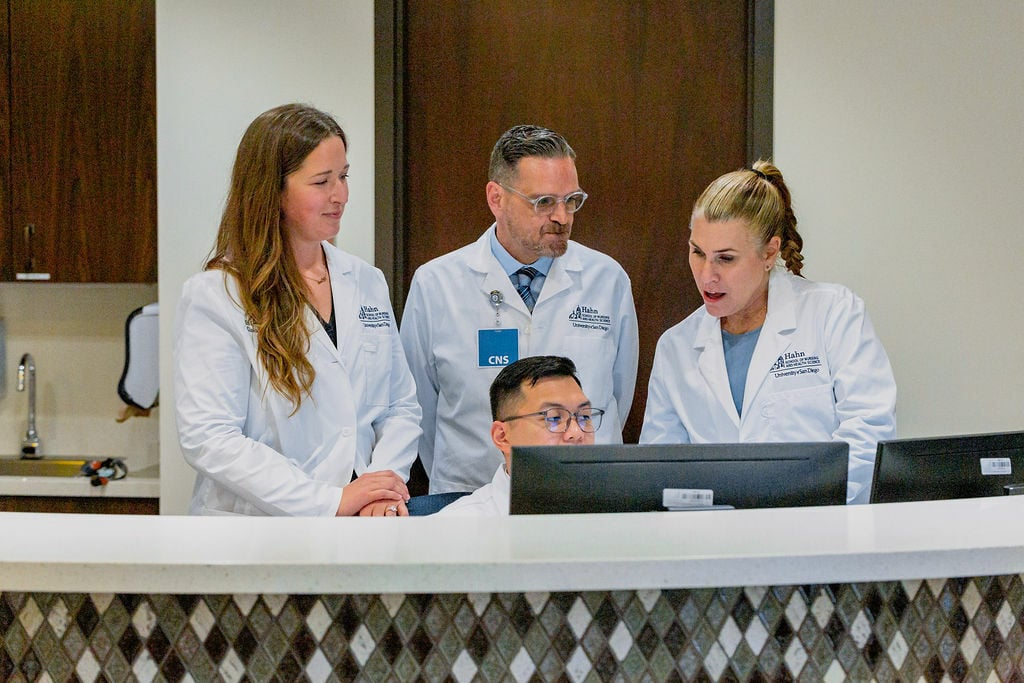
Discover the Benefits of a Nursing Degree From USD
The information in this blog post is for informational purposes only and is not intended to replace medical, financial, or professional advice.
Today’s nursing workforce is expanding into arenas separate from traditional clinical practice — from leadership and ethics, from research to public policy. As a result, careers for those with nursing skills are growing and diversifying, too. Nurses are increasingly finding work in varied career settings that offer both stability and flexibility.
As the need for nurses expands, the demand for those with a Master of Science in Nursing continues to grow. In fact, according to the Bureau of Labor Statistics, many positions that require an MSN are expected to experience considerable job growth over the next decade, rising 26 percent from 2018 to 2028 (considerably faster than the 5 percent projected growth for all occupations). In addition, nurses with a graduate degree earn an average of $113,930 per year, which is well above the $71,000 median salary for RNs. Yet only 13 percent of nurses currently hold a master’s degree, making now the perfect time to propel yourself to the forefront of this rapidly growing field.
If you have been out of school for a few years, returning to pursue your MSN can seem daunting. You might have a family, along with a career and many other personal commitments. You may have concerns about keeping up with your coursework and about obtaining financial aid for nursing school.
You are not alone.
In fact, According to the National Center for Education Statistics, approximately three million students who enrolled in U.S. colleges and universities in 2019 were 35 years of age or older. The good news is that graduate nursing programs often look different from what you may remember in your undergraduate days. Many MSN programs are designed knowing that students often work while pursuing their degree by offering flexible scheduling options and ways to incorporate your current work experience.
If you are considering going back to school for an MSN, here are seven tips to help you navigate the return to nursing school:
1. Do your research.
From schedules to clinical placements, from program completion options to financial aid – there is much to research when looking into MSN programs. Look into what options are available for flexible scheduling. Find out which programs offer the learning outcomes and possible career opportunities you want. Check into the costs and financial aid options. Find out if a school will help you with clinical placements.
Pro Tip: While many other universities expect students to find their own clinical placements, USD provides MSN and DNP students with clinical placements tailored to their interests. At USD, you will be guaranteed a clinical placement, and the time you would have spent researching and worrying over where and how to apply for one can be put to better use.
Further, remember to dig deeper into a school’s website before making a commitment. Program faculty, advisers, current students, and alumni can also be valuable sources of information.
2. Know your financing options.
Achieving your MSN can be a major investment in your future, but with the growing need for nurses, there are a lot of financing options available that don’t require dipping into your personal savings. Scholarships and grants are often offered for students pursuing advanced degrees in specific specialties, such as Gerontology, Anesthesia, and Trauma Nursing among others.
Professional associations and nursing foundations are also excellent resources for students looking for assistance. Some advanced nursing specialties may even qualify for the Nursing Education Loan Repayment Program. Check with your program, talk with a supervisor or mentor, and explore all your options for financing your advanced nursing degree.
3. Establish your priorities.
Juggling school with a career, a family, and your personal life can be a challenge but is certainly doable! The best way to navigate this challenge is to define your priorities before you enter graduate school and then carefully plan accordingly.
Once you enter graduate school, attending class, studying, and completing assignments will all rise in importance. Think about what you can temporarily let go of to make room for the things that really matter during this time. Keep in mind, this period of life will not last forever, and soon you will have your degree, along with more time to dedicate to the things you placed on hold.
4. Maintain your support system.
Keep yourself afloat by making sure the important people in your life like your family, friends, supervisor, and coworkers know what your commitments are. Keep these people informed about your schedule and any possible conflicts that might arise due to class, clinicals, or study time. Remind them of your ongoing dedication to your commitments by following through, being present, and staying engaged when you are with them.
Your support system is invaluable, and even if you are not able to dedicate as much time to spending with loved ones as you would like, make sure to express your gratitude for their support during this time.
5. Nail down your time management skills.
Even if you have a flexible schedule, coursework and clinical hours can be time-consuming. You should be prepared to dedicate a set number of hours per week to your studies and/or clinical requirements. Plan your weeks in advance to allow yourself the proper amount of time to complete any coursework, while leaving room to stay focused at work and enjoy some down time with your family and friends. Figure out how much time you will need to spend on coursework and studying, then block out that time. Some people prefer to take frequent, short periods of time to study while others get the most from setting aside one full day to really focus.
You may need to try out some different strategies before finding the one that works for you, especially if you have been out of school for several years. Once you set that time aside, make sure people know it is for you alone. This might mean heading off to the local library or kicking your significant other out of the house for a couple of hours.
6. Learn some new tricks.
Keep in mind that going back to school is a learning process! Habits that worked for you during your undergraduate experience might not work now. Taking notes by hand may help you concentrate, but using a laptop or digital recording device in class might make studying more effective. There are a number of technologies and resources that are designed to make your life easier, from taking notes to managing your calendar. Explore new tools and tricks and do not be afraid of trial and error, and once you find something that fits your needs, leave the rest behind.
7. Remember why you are doing this.
When challenges arise, and they will, focus on your goals. Remind yourself why you wanted to go back to school, and give yourself the permission to adapt and improve. By choosing to pursue a Master of Science in Nursing, you are joining a unique and expert community who have the skills to transform the field of health care, and you should be proud of yourself for taking this important step.
If you find yourself losing steam, set milestones and reward yourself along the way. Setting goals and celebrating your achievements is not only fun, it is a great way to stay motivated. And remember, graduate school is temporary, but the return on investment is real, measurable, and lifelong.
Connect with the University of San Diego Nursing Community!
With a rich heritage of excellence in nursing education, the University of San Diego Hahn School of Nursing blends rigorous academics, state-of-the-art technology, and innovative teaching. While these elements are key to achieving your goals, we also believe in a culture of compassion. Our faculty — internationally recognized scholars and clinicians — nurture and support each student, instilling the confidence needed to make a real difference.
If you are interested in joining the University of San Diego nursing community, we invite you to request more information or start your online application today! We cannot wait to help you achieve your goals.
Download A Guide to Achieving the Master's of Science in Nursing at USD — your go-to resource for earning an MSN!
The information provided by USD’s Hahn School of Nursing and Health Science is for informational purposes only and is not intended to replace professional medical or financial advice. This includes, but is not limited to, blog posts, eBooks, webinars, emails, graphics, social media posts, and other content. Always seek the guidance of your physician or a qualified medical or financial professional.
A Guide to the University of San Diego's Adult-Gerontology Clinical Nurse Specialist Program
The University of San Diego's nursing program ranks among the best in the nation. But that's not the only reason future students walk through our doors to pursue one of our graduate degrees. Download our guide for an in-depth look at the Adult-Gerontology Clinical Nurse Specialist program and learn how our rich heritage of excellence in nursing education can help you achieve your academic and professional goals.
GET THE GUIDE







